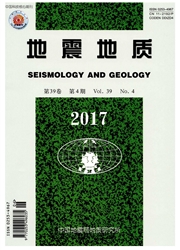

 中文摘要:
中文摘要:
2008年汶川8.0级地震之后,仅过5a时间,2013年在汶川以南的芦山发生了7.0级地震,龙门山断裂带南段的地震危险性成为关注的热点。通过地震地质调查和古地震研究,发现龙门山断裂带南段——双石一大川断裂(芦山地震震区以南段)在全新世有过新活动,主要表现为断续展布的槽谷地貌,探槽揭露断层断错了晚第四纪地层。综合历史地震史料分析认为,1327年天全地震震中应在四川天全一带,与双石-大川断裂新活动有密切关系;通过对比分析,认为其震级可定为6 1/2-7级。
 英文摘要:
英文摘要:
The 2008 Wenchuan earthquake occurred along the Longmen Shan fault zone,only five years later,another M7 Lushan earthquake struck the southern segment where its seismic risk has been highly focused by multiple geoscientists since this event. Through geological investigations and paleoseismic trenching,we suggest that the segment along the Shuangshi-Dachuan Fault at south of the seismogenic structure of the Lushan earthquake is active during Holocene. Along the fault,some discontinuous fault trough valleys developed and the fault dislocated the late Quaternary strata as the trench exposed. Based on analysis of historical records of earthquakes,we suggest that the epicenter of the 1327 Tianquan earthquake should be located near Tianquan and associated with the ShuangshiDachuan Fault. Furthermore,we compared the ranges of felt earthquakes( the 2013 M7 Lushan earthquake and the1970 MS6.2 Dayi earthquake) and suggest that the magnitude of the 1327 Tianquan earthquake is more possible between 6 and 7. The southern segment of the Longmen Shan fault zone behaves as a thrust fault system consisting of several sub-paralleled faults and its deep structure shows multiple layers of decollement,which might disperse strain accumulation effectively and make the thrust system propagate forward into the foreland basin,creating a new decollement on a gypsumsalt bed. The soft bed is thick and does not facilitate to constrain fault deformation and accumulate strain,which produces a weak surface tectonic expression and seismic activity along the southern segment,this is quite different from that of the middle and northern segments of the Longmen Shan fault zone.
 同期刊论文项目
同期刊论文项目
 同项目期刊论文
同项目期刊论文
 期刊信息
期刊信息
